-
Avoiding Sibling Jealousy During Play Dates
An exciting part of your child starting preschool is that he or she may begin having play dates with friends from school. These play dates are different from the ones that kids have when they are younger, when kids typically end up playing with the kids of their parents’ friends. Preschool play dates are instigated by the relationships kids build at school and are a vital part of child development. One tricky area to navigate with these play dates is how to make sure siblings don’t feel left out. When your child starts preschool in Pembroke Pines and begins having play dates, keep the peace with siblings with these strategies.
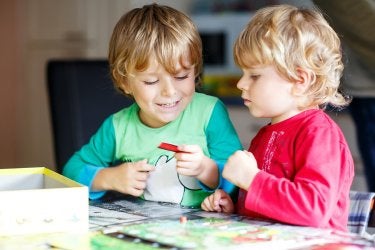
Talk About the Play Date in Advance
Before the play date starts, get all of your kids to sit down together and talk about what to expect. Talk about activities everyone can do together, such as baking cookies, and also about things that the child who is hosting the play date wants to do alone with his or her guest. Talking through the ideas in advance will help siblings understand their role in the play date to reduce the chance of conflicts occurring.
Don’t Force Inclusion
If you force your preschooler and his or her friend to include siblings in all of their activities, everyone will feel resentful. Your child and his or her friend will also lose out on the opportunity to practice their relationship skills and build on this important part of child development. Make a rule that siblings have to be kind to each other, but don’t force kids to play together. Without the pressure of forced inclusion, you may be surprised at the way that kids actually reach out to each other.
Find Alternate Activities
Prevent siblings from feeling left out by finding other things for them to do. You may ask them to help make snacks for everyone, for example, or you may take advantage of the opportunity to have one-on-one time together. This can turn play dates into a positive experience for everyone.
-
How Your Preschooler Will Display Independence
Most parents love to do as much as they can for their kids, but it’s also important for children to learn how to do things for themselves. When your child reaches preschool age, he or she will start taking steps toward independence. Your child’s preschool teacher in Pembroke Pines will support these tendencies by encouraging him or her to use language to express needs and wants , rather than resorting to temper tantrums.
Some preschoolers display their independence by saying the word “No!” frequently. This can get frustrating, and it’s a problem that is best dealt with proactively. Instead of making open-ended statements, like “Let’s get ready for bedtime,” try giving your child a choice of two options. This lets your child feel in control of the situation, and it reduces the use of the word “No.” For example, you could say, “We can read the turtle book or the magical fairy book before bedtime. Which one do you want?”
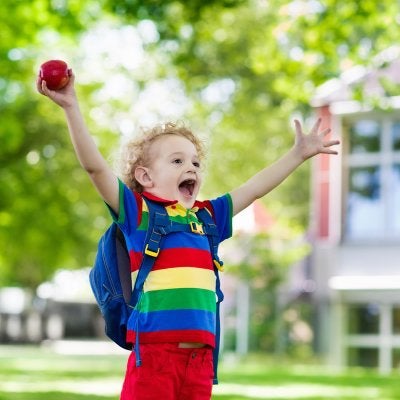
-
Motor Skill Milestones in Pre-K
Kids in pre-K go through an amazing number of transitions that always amaze parents. In particular, kids in this age group reach a number of important milestones with their motor skills. If your child is enrolled in pre-K in Pembroke Pines, keep an eye out for these exciting developmental changes.
Both gross and fine motor skills take a leap in pre-K. In terms of gross motor skills, kids learn to control their running more precisely, including stopping and turning more gracefully. Kids at this age learn to hop on one foot, do somersaults, and bounce, catch, and throw a ball. Parents are also thrilled to discover that their kids can now brush their teeth, comb their hair, and dress themselves without help. Fine motor skill development in pre-K includes learning to print letters, cutting on a line, and using utensils appropriately. Copying shapes, like crosses and squares, also becomes easy.
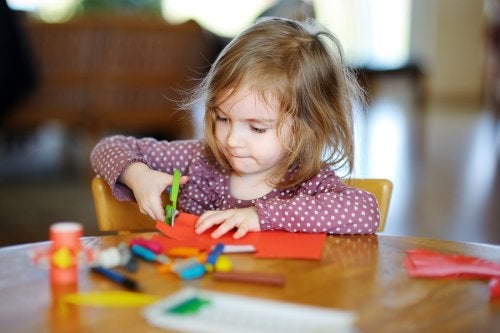
-
Helpful Homework Habits
Homework is an important task in every child’s early education. It helps them retain the concepts they have learned, and it enforces accountability outside of school. There are many ways to create helpful homework habits after children leave school. Enrolling them in afterschool programs in Pembroke Pines encourages homework help, and creating the right environment at home will reinforce the importance of homework. Here are a few habits that will help children with their homework:
- Keep a routine time and place that children can do their homework. If they participate in an afterschool program, then they may finish their homework before coming home. If they do not, then set aside a quiet place that children can work.
- Observe the different ways that children respond to homework and adjust accordingly. If a child becomes easily distracted, then work together to eliminate and overcome the distractions.
- Always maintain contact with the teachers. Early education teachers and parents can communicate to understand how children respond at home versus at school. This communication can help prevent future problems with understanding concepts or behavioral issues.

-
Packing Snacks for Your Summer Camper
Summer camp is practically a rite of passage for kids. In Pembroke Pines, summer day camps feature lots of fun activities and opportunities for kids to make new friends. Unfortunately, it can be difficult for parents to get children to eat healthy foods while at summer camp. The trick is to make healthy snacks look fun to eat. You can see some demonstrations of this when you watch this interview with a registered dietitian.
She explains what she looks for in a healthy snack—primarily a combination of lean proteins and complex carbohydrates to give your child the energy needed for summer camp activities. For instance, you can add a little mustard to some low-sodium turkey slices, and wrap them around a thin, whole grain breadstick. Pack pepper strips and carrot sticks to dip into some low-sugar, plain or vanilla Greek yogurt. You could also stuff some granny smith apples, cinnamon, and low-fat ricotta cheese into a whole grain pita pocket.
-
Cognitive Development: Age 3
It is a fun and interesting time when children pass their toddler years and turn three years old. At this age, children are learning more about the world around them, and their preschool activities are filled with make-believe games and sensory-based learning. Here is a better look at the cognitive development of three-year-old children and how their preschool near Pembroke Pines can foster their growth:
As shown in the video, three-year-old children are exploring their world and learning through their different senses. They love to touch objects—such as puzzles and blocks in their learning center—and they enjoy playing make-believe games. This preschool age is the perfect time to encourage children to dress up and use their imagination. Three-year-old children are also learning different concepts, such as those related to time. Foster this understanding by setting a timer to signify the beginning or end of activities.
-
The Stages of Language Development
Did you know that early childhood education begins at birth? As soon as your child enters the world, he or she is soaking up knowledge from the world around him or her. You can begin preparing your child for preschool in Pembroke Pines even before his or her first birthday. The first stage of your child’s early education in language is the phonation stage. From one to two months, your child will develop vowel and throaty sounds.
Then, as the early education expert in this video explains, your child will enter the “goo” stage from two to three months. Here, you’ll hear the cooing sounds that are typical for babies. As your child grows, his or her babbling will gradually take on the rhythms of speech and gestures will be used to communicate. Most children say their first one or two words at around the time of the first birthday.
-
Developmental Milestones in Four-Year-Olds
Four is an exciting year for parents and children alike. Four-year-olds are eagerly embracing their newfound independence and they are actively developing the skills they will need in kindergarten and beyond. You’ll begin to see your child take on a more clearly defined personality as he or she progresses through pre-kindergarten . Consider talking to your child’s pre-k teacher in Pembroke Pines about ways of supporting your child’s healthy development at home.
Motor Skills
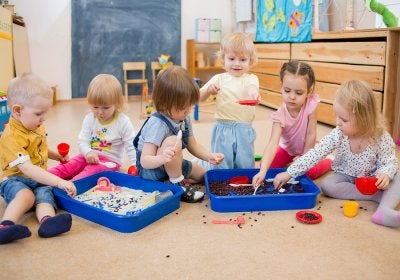 Pre-k kids are working on both gross and fine motor skills. In fact, parents are often amazed at the boundless energy of their four-year-olds. A four-year-old should generally be able to balance briefly on one foot, hop on one foot, and walk up the stairs without assistance. As pre-k kids progress toward their fifth birthdays, they begin to try new skills like somersaulting, climbing, swinging, and skipping. Fine motor skills become much more developed during this year. Your child should be able to print some letters, use cutlery, copy geometric patterns, and get dressed and undressed without assistance.
Pre-k kids are working on both gross and fine motor skills. In fact, parents are often amazed at the boundless energy of their four-year-olds. A four-year-old should generally be able to balance briefly on one foot, hop on one foot, and walk up the stairs without assistance. As pre-k kids progress toward their fifth birthdays, they begin to try new skills like somersaulting, climbing, swinging, and skipping. Fine motor skills become much more developed during this year. Your child should be able to print some letters, use cutlery, copy geometric patterns, and get dressed and undressed without assistance.Language Use
You might notice that your four-year-old eagerly looks forward to story time. He or she may even begin recalling parts of a story on his or her own. During this year, he or she should begin speaking sentences longer than five words, use the future tense, and clearly speak his or her name and address.
Cognitive Development
Pre-kindergarten programs guide children in learning the essential skills they’ll need later on, including pre-math skills. During this year, your child should be able to name at least four colors and he or she should have a general understanding of the passage of time. Your child should be able to count 10 or more objects.
Socio-Emotional Development
One major benefit of high-quality pre-k programs is the social skills that kids acquire. Your child will enjoy spending time with friends. He or she will adjust to the idea of cooperative and group play. Your child may be very interested in fantasy play, but in many cases he or she will know how to distinguish reality from fantasy.
-
Cultivating Empathy in Your Young Child
When your child is between the ages of three and four, he or she can enjoy preschool activities at a learning center in Pembroke Pines. Socializing with other preschool students will help your child develop empathy, but there are also steps you can take at home to cultivate empathy in your young child. Empathy is crucial for your child’s lifelong emotional stability and ability to work well with other people. The empathetic child is capable of distinguishing his or her feelings from those of others, understanding the perspective of others, and regulating his or her own emotional response.
Help your child identify his or her emotions.
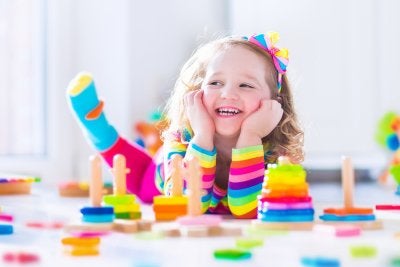 Preschool students are still working on learning how to identify their emotions and communicate their feelings. Sometimes, falling short in these areas can prompt a child to experience behavioral meltdowns. Label emotions whenever possible. For example, you could tell your child, “Thank you for the hug. That was so kind of you,” “I like how you shared your train with your baby sister. It’s made her so happy!” or “It must have made you sad to lose your teddy bear. Let’s see if we can find it together.”
Preschool students are still working on learning how to identify their emotions and communicate their feelings. Sometimes, falling short in these areas can prompt a child to experience behavioral meltdowns. Label emotions whenever possible. For example, you could tell your child, “Thank you for the hug. That was so kind of you,” “I like how you shared your train with your baby sister. It’s made her so happy!” or “It must have made you sad to lose your teddy bear. Let’s see if we can find it together.”Encourage the open sharing of feelings.
Young children need to know that their parents are actively listening to them and acknowledging their feelings. Make eye contact and listen carefully when your child speaks to you. Respond with joy when your child shares his or her happy feelings or with sadness when your child is upset. Share your own feelings with your child to help him or her understand that everyone has emotions and that part of life involves learning how to cope with them.
Assign responsibilities to your child at home.
Early childhood development research suggests that children who have small responsibilities at home generally become individuals who are caring and empathetic. Simple tasks like feeding the dog or helping you fold laundry will teach your child the value of helping others. Similarly, it will help your child to better appreciate when other people do nice things for him or her.
-
Highlighting Pre-Academic Skills Learned in Preschool
Giving your child the experience of preschool will help as he progresses to pre-kindergarten and into grade school. Various preschool activities can form the building blocks of early academic skills and child development in Pembroke Pines. Through these fun and engaging activities, your child will gain new experiences that will follow him throughout his academic career.
Preschool classes are typically filled with laughter and playtime. However, that same playtime is teaching children the basic foundational concepts associated with reading, writing, science, and math. A child might see his coloring page as a fun craft, but his preschool teacher knows that he is learning fine motor skills to help with future writing worksheets. The class may enjoy digging in the dirt to plant seeds, but their teacher knows that she is teaching them a simple concept of earth science. These are just a few examples of the various skills and life lessons your child will learn with a preschool curriculum. If you are curious to learn more, contact a preschool near you to schedule a campus visit.
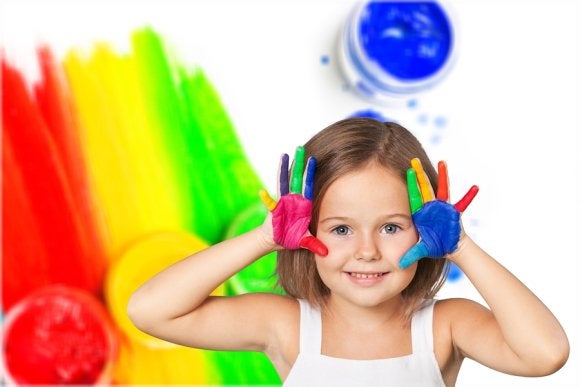
RECENT POSTS
categories
- Uncategorized
- Early Learning Center
- Pre-K
- Children
- Child Care Center
- Preschooler
- Preschool Blog Category | Tanglewood Academy
- Preschool Lunch
- Tanglewood Academy
- After-School Program
- Toddler School
- Early Childhood Education
- preschool activities
- pre-kindergarten
- childhood education
- pre-kindergarten programs
- Children’s education
- enrichment opportunities
- Kindergarten
- Nurturing Education Environment
- Toddler Care
- Child Separation Anxiety
- Toddlers
- Summer camp
- summer activities
- VPK
- Voluntary Pre-K
- Outdoor Activities
- Smart Strategies
- Tie Shoes
- Snacks
- Physical Activities
- Education
- Enrichment Activities for Kids
- Early Education Activities
- Preschool Curriculum
- Classroom Learning
- APPLE accreditation
- Language Comprehension
